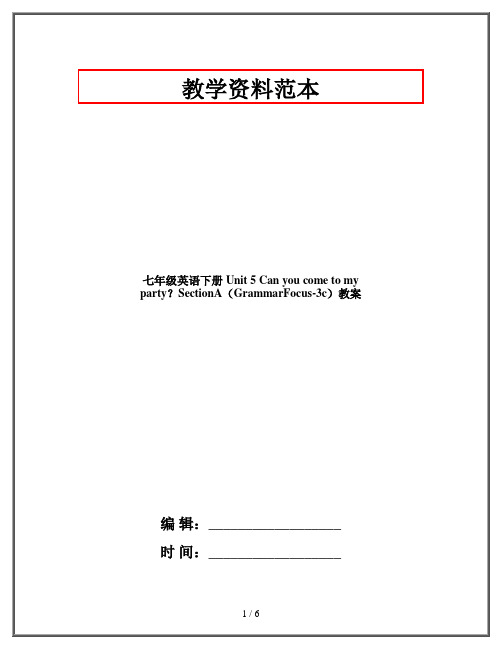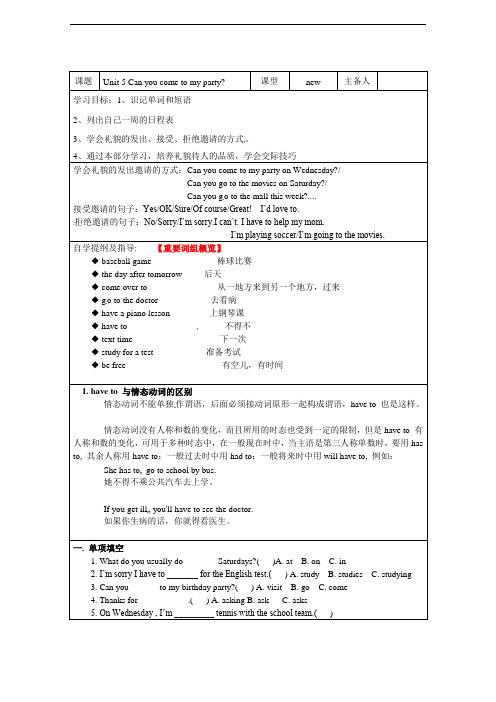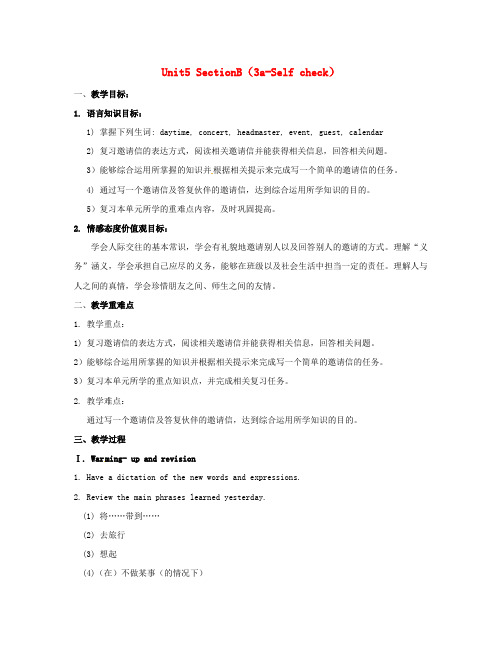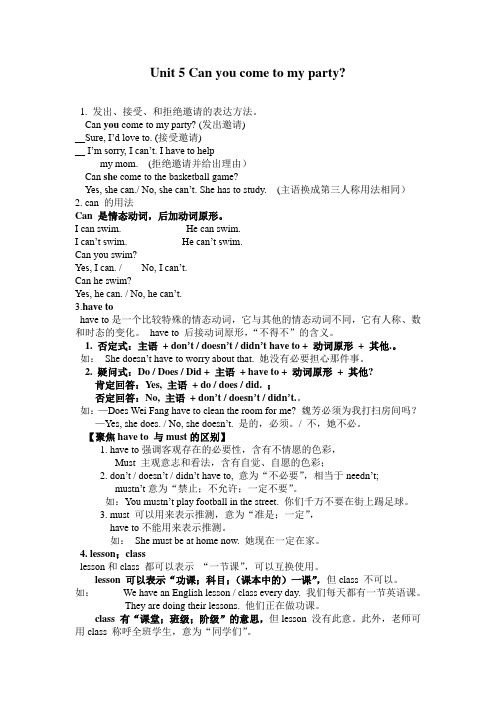Unit 5 Can you come to my party?
- 格式:doc
- 大小:61.50 KB
- 文档页数:6

Unit5 SectionA(Grammar Focus-3c)一、教学目标:1. 语言知识目标:1) 学习掌握下列词汇:invite, accept, refuse2)进行一步复习巩固运用Section A 部分所学的生词和词组。
3)进一步学习运用所学的知识来表达邀请;学会如何回答别人对自己的邀请,以及学会如何有礼貌地拒绝他人的邀请,并陈述理由。
4) 掌握情态动词can, must, have to, might的用法。
2. 情感态度价值观目标:学会人际交往的基本常识,学会有礼貌地邀请别人以及回答别人的邀请的方式。
理解“义务”涵义,学会承担自己应尽的义务,能够在班级以及社会生活中担当一定的责任。
理解人与人之间的真情,学会珍惜朋友之间、师生之间的友情。
二、教学重难点1. 教学重点:1)进一步学习运用所学的知识来表达邀请;学会有礼貌地答复他人对自己的邀请。
2) 掌握情态动词can来表达邀请;运用情态动词have to, must,might等有礼貌地说明拒绝他人邀请的理由。
2. 教学难点:1) 能熟练进行邀请及应答。
2) 运用情态动词have to, must, might等有礼貌地说明拒绝他人邀请的理由。
三、教学过程Ⅰ. Warming- u p and revision1. Have a dictation of the new words learned in the last class.2. Ask some Ss to invite some Ss to his/her party. The partners give some answers.S2:Sure. I’d love to.S3: Sorry, I can’t. I have to look after my sister at home.S4: …3. Role-play the conversa tion in 2d.Ⅱ. Grammar Focus.1. 学生阅读Grammar Focus中的句子,然后做填空练习。

课题Unit 5 Can you come to my party? 课型new 主备人学习目标:1、识记单词和短语2、列出自己一周的日程表3、学会礼貌的发出、接受、拒绝邀请的方式。
4、通过本部分学习,培养礼貌待人的品质,学会交际技巧学会礼貌的发出邀请的方式:Can you come to my party on Wednesday?/Can you go to the movies on Saturday?/Can you g o to the mall this week?....接受邀请的句子:Yes/OK/Sure/Of course/Great! I’d love to.拒绝邀请的句子:No/Sorry/I’m sorry.I can’t. I have to help my mom.I’m playing soccer/I’m going to the movies.自学提纲及指导: 【重要词组概览】◆ baseball game棒球比赛◆ the day after tomorrow后天◆ come over to从一地方来到另一个地方,过来◆ g o to the doctor去看病◆ have a piano lesson上钢琴课◆ have to不得不◆ text time下一次◆ study for a test准备考试◆ be free有空儿,有时间1. have to 与情态动词的区别情态动词不能单独作谓语,后面必须接动词原形一起构成谓语,have to 也是这样。
情态动词没有人称和数的变化,而且所用的时态也受到一定的限制,但是have to 有人称和数的变化,可用于多种时态中,在一般现在时中,当主语是第三人称单数时,要用has to, 其余人称用have to;一般过去时中用had to;一般将来时中用will have to, 例如:She has to go to school by bus.她不得不乘公共汽车去上学。


新目标八年级英语上册Unit5 Can you come to my party?讲解与练习姓名班级讲解【重要词组】◆ baseball game棒球比赛◆ the day after tomorrow后天◆ come over to从一地方来到另一个地方,过来◆ go to the doctor去看病◆ have a piano lesson上钢琴课◆ have to不得不◆ next time下一次◆ study for a test准备考试◆ be free有空儿,有时间◆on weekdays在工作日里◆keep quiet保持安静◆the whole day整天◆culture club文化俱乐部【部分词汇用法】1. lesson功课,课程,课,教训1). do one’s lessons做功课:I usually do my lessons in the evening.2). have a lesson / have lessons(学生)上课:I had an art lesson yesterday.3). give a lesson to sb. / give lessons to sb.(老师)给某人上课:Our math teacher gave a funny lesson to us. 4). teach (或) give sb. a lesson给某人一个教训:The terrible illness taught him a lesson, so he wanted to exercise every day.2.another(不定数目中的)另一,再一,别的作形容词:I am still hungry. I want to have another apple.作代词:I don’t like this shirt. I want to have a look at another.1. from one to another 从一个到另一个:I’m going hiking from one city to another.2. one after another 一个接着一个I love apples, so I eat one after another when there are some at home.【重要词汇辨析】◆◆◆◆◆◆◆◆◆◆◆◆◆◆◆◆◆◆others/another/the other/the othersothers作代词(复数),泛指别人或其他东西Some say yes, but others say no.another作代词(单数),泛指三个以上不定数目的人或事物中的另一个the other作代词(单数),表示两者中的另一个人或事物,常构成one…the other短语I have two pens. One is red and the other is black.the others作代词(复数),表示全体中除去一部分后其余所有的人后事物20 students in our class are English and the others are Chinese.thank you for / thanks for 后面跟sth./ doing sth.Thank you for your invitation. Thanks for coming to my party.◆Whole/ all1. 常可互换,但whole位于the和物主代词之后all my morning与my whole morning2. all 不与a / an 连用,whole可以可以说a whole year,但不可以说all a yearwho谁, whom谁, whose谁的who 问作主语的“谁”:Who can open this door?whom 问作宾语的“谁”:Whom are you looking after?注意:口语中who和whom可以通用;whose 问事物的主人:Whose book is it?与come构成的常用词组come over顺便来访come from来自… come back回来,come down下来,come up上来败落产生come out出来come on赶快,来吧come in 进来,出现 come up with提出,赶上【重要词句详解】1.I have to help my parents . 我不得不帮助我的父母。

Unit5 SectionB(3a-Self check)一、教学目标:1. 语言知识目标:1) 掌握下列生词: daytime, concert, headmaster, event, guest, calendar2) 复习邀请信的表达方式,阅读相关邀请信并能获得相关信息,回答相关问题。
3)能够综合运用所掌握的知识并根据相关提示来完成写一个简单的邀请信的任务。
4) 通过写一个邀请信及答复伙伴的邀请信,达到综合运用所学知识的目的。
5)复习本单元所学的重难点内容,及时巩固提高。
2. 情感态度价值观目标:学会人际交往的基本常识,学会有礼貌地邀请别人以及回答别人的邀请的方式。
理解“义务”涵义,学会承担自己应尽的义务,能够在班级以及社会生活中担当一定的责任。
理解人与人之间的真情,学会珍惜朋友之间、师生之间的友情。
二、教学重难点1. 教学重点:1) 复习邀请信的表达方式,阅读相关邀请信并能获得相关信息,回答相关问题。
2)能够综合运用所掌握的知识并根据相关提示来完成写一个简单的邀请信的任务。
3)复习本单元所学的重点知识点,并完成相关复习任务。
2. 教学难点:通过写一个邀请信及答复伙伴的邀请信,达到综合运用所学知识的目的。
三、教学过程Ⅰ. War ming- up and revision1. Have a dictation of the new words and expressions.2. Review the main phrases learned yesterday.(1) 将……带到……(2) 去旅行(3) 想起(4)(在)不做某事(的情况下)(5) 以便于;以至于(6) 期望;盼望(7) 一个令人吃惊的聚会(8) 收到某人的信3. Talk about David’s party and complete the blanks in the big screen.(短文内容见大屏幕)Ⅱ. Lead-in1. Ask Ss what an opening party is. And ask them if they have come to an opening party. S1: I know. When a building is put into use, people often ha ve a ceremony to celebrate it. It’s an opening. Last year, our new school is put into use. We had a great opening.Ⅲ. Reading1. T: Now let’s work on 3a:A new school library is put into use. They’ll have a great opening. The headmaster writes many invitations to the parents of their school. Now read the invitations below and answer the questions.2. 阅读指导:首先,快速阅读短文,整体把握短文大意。

Unit 5 Can you come to my party?1. 发出、接受、和拒绝邀请的表达方法。
__Can you come to my party? (发出邀请)__Sure, I’d love to. (接受邀请)__ I’m sorry, I can’t. I have to helpmy mom. (拒绝邀请并给出理由)Can she come to the basketball game?Yes, she can./ No, she can’t. She has to study. (主语换成第三人称用法相同)2. can 的用法Can 是情态动词,后加动词原形。
I can swim. He can swim.I can’t swim. He can’t swim.Can you swim?Yes, I can. / No, I can’t.Can he swim?Yes, he can. / No, he can’t.3.have tohave to是一个比较特殊的情态动词,它与其他的情态动词不同,它有人称、数和时态的变化。
have to 后接动词原形,“不得不”的含义。
1. 否定式:主语+ don’t / doesn’t / didn’t have to + 动词原形+ 其他.。
如:She doesn’t have to worry about that. 她没有必要担心那件事。
2. 疑问式:Do / Does / Did + 主语+ have to + 动词原形+ 其他?肯定回答:Yes, 主语+ do / does / did. ;否定回答:No, 主语+ don’t / doesn’t / didn’t.。
如:—Does Wei Fang have to clean the room for me? 魏芳必须为我打扫房间吗?—Yes, she does. / No, she doesn’t. 是的,必须。
课堂教学设计U5 Can you come to my party?Section AI.Teaching Objectives1. Knowledge Objectives(1)To master the usage of the new words: until, catch, accept, refuse(2)To master the usage of “ Can you/he/she/they... ? ”.(3)To master the phrases: hang out2. Ability Objectives(1)Understand the conversations about invitations.(2) Use the objective sentences to invite others or accept/turn down invitations.3. Moral ObjectivesStudents learn to communicate with others politely.II.Teaching Key and Difficult PointsStudents may have some trouble expressing their ideas about the answers to invitations.III.Teaching MethodsCommunicative Language Teaching Methods;Task-based Language Teaching MethodsIV.Teaching ToolsPPT, blackboardV.Teaching ProceduresStep 1. Lead-inShow two pictures of myself and ask students the questions.T: Can you come to my party on Saturday?Ss: Sure, I ’d love to. / Sorry, I can ’t. / Sorry, I ’m not available/free. T: Can you go to the movies tomorrow night?Ss: Sure, I ’d love to. / Sorry, I can ’t. / Sorry, I ’m not available/free. Then show some more pictures and ask students the questions. T: Can he/she/they come to my party on Saturday?Ss: Sure, he ’d/she ’d/they ’d love to. / Sorry, he/she/they can ’t. / Sorry, he ’s/she ’s/they ’re not available/free.The p urpose is to review the sentences they have learned and prepare for the next step.Step 2. Presentation 1. PPT shows the objective sentences together and T leads students to summarize the grammar.How to invite others?____________________________________How to accept others?____________________________________How to refuse others?_____________________________________Ask students to try to remember the sentence patterns.2. ExerciseStudents do the exercises in 3c. They use the words in brackets to complete the sentences.Teacher gives students 3minutes to do it.Check the answers.3. Guessing game.T asks six students to come in the front of the classroom and act. The other students can guess their meaning.T: Can he /she come to my party?Ss: Sure, he ’d /she ’d /they ’d love to. / Sorry, he/she/they can ’t. / Sorry, he ’s/she ’s/they ’re not available/free.The purpose is to arouse students ’ interest.Step 3. Practice1. T: I have a friend. His name is Jeff. Now he is inviting his friend Nick to come to his house and meet his cousin Sam. Now let ’s read Can you...? Sorry, I can ’t./ Sorry, I ’m not available/free. Sure, I ’d love to./ Sure, it sounds Sorry, I can ’t./ Sorry, I ’m not available/free.their conversation and the questions.Students find the answers to the questions by themselves within 2 minutes. Then check the answers.2.Students role-play the conversation. T asks some pairs to show the work.3.Students put up some difficult points and T gives some comments on the language points:(1) go bike riding 去骑自行车(2) not...until 直到...才(3) hang out 闲逛(4) Catch you! 再见Step 4. Consolidation (Group work)T gives some instructions.Students work in groups to ask and answer. The group leader invite others to a party or some other events using the sentences they have learned. Finally, the group leader gives a report like this: I am going to ... on Saturday afternoon. I’m glad that... can come. But ... can’t come...because...Step 5. Homework(1) Invite students to go to movies. Make a conversation with others like this(A-C): A: Can you go to the movie on Saturday evening?B: Sorry, I can’t. I have to …(2) 同步学习(A-D)Step 6. Blackboard DesignUnit 5 Can you come to my party?Section A 2d-3c--Can you come to my party? hang out--Sure, I’d love to. not...until--Sorry, I can’t./ Sorry, I’m not available/free. Catch you!。
Unit 5 Can you come to my party ?例1 —Can you come to my party?—_____________A. No, I don’tB. Sure , that’s rightC. Sure ,I’d love toD. Quiet well【解题思路】选C。
此题考查对邀请用语的回答。
对邀请用语的回答,肯定回答用“Y es/Sure/ Certainly/ I’d love to”; 否定回答,就应委婉的说:“I’m sorry, I can’t.”例2 Thank you for ___________me to your party.A. takeB. askingC. to helpD. telling【解题思路】选B。
此题考查thank you/thanks for…句型的运用。
for后面一般有两种情况:(1)名词,如Thanks for your help/ invitation.(2)动词+ing,如Thanks for your helping me/ inviting me to your party.例3 -- Mum, do I need to bring an umbrella with me?--I’m afraid you_________. It’s raining hard.A. will have toB. needC. canD. needn’t【解题思路】此题中的need是行为动词,肯定回答可用助动词do代替,也可用need to。
也可用have to代替,但have to强调客观上的必要性。
选A例4 --Let’s go and play football, ______ ?--That’s wonderfu l. A. will you B. do you C. won’t you D. shall we【解题思路】选D。
Unit5 Can you come to my party? SectionA 教学设计教材分析:本单元主要围绕“can you come to my party?”这一主题展开各种教学活动,并以这一主题引出怎样接受或拒绝别人的邀请。
本节课是第一课时,内容为1a-2d 部分,围绕“邀请”这一话题,开展教学活动,并以这一主题引出怎样接受或拒绝别人的邀请。
本课旨在创造一个轻松、愉快的学习、交流环境,是一个涵盖听、说、读、写、演,学生通过“任务---探究---创造--- 评价”型教学的方法,在有趣、开放式的语言环境中,学会观察、思考、讨论、模仿运用语言和总结,培养学生综合运用这些知识进行英语交际的能力能力。
学情分析:本单元教材面对的是七年级下学期的学生,基本上都有四五年的英语学习年龄。
对于英语的基本学习出现以下问题:学得会,看得懂,会做题,可是不会说或不敢说。
同时学生的英语能力产生了一定的差距,特别是在知识和语言技能上的差距比较明显。
他们有一定的兴趣,渴望被肯定,但由于差距,有的学生接受能力差反映能力慢,害怕当众说英语,不敢表现自我。
教学理念:本单元语法以情态动词can 的用法为主,句型也是简单的表达难度不大,根据新课程标准提倡的任务型教学,在课堂教学中我们设计了不同形式的任务,以便充分训练学生的听、说、读、写技能,培养学生综合运用英语进行交际的能力,我结合本单元的题材,以视频中老鼠的wedding party 进行warm up,再以三个问题导入课文,课堂中利用图片、笑脸和苦脸引导学生使用语言,重在“语言应用”教学目标:1.知识目标:a.学习,理解掌握和运用以下单词: prepare, prepare for, exam,flu,go to the doctor.help parentb.学习,理解掌握和运用以下词组①prepare for an exam; ②help my parents; ③go to the doctor; ④meet my friend; ⑤have the flu; ⑥on Saturday afternoonc.学习,理解掌握和运用以下句子:A: Can you come to my party on Saturday afternoon?B: Sure, I’d love to.C: Sorry, I can’t. I have to prepare for an exam.D: I’m sorry, too. I must go to the doctor.E: Thank you for asking/inviting me/your invitation.2.能力目标:a.能够提出邀请、接受邀请、婉言拒绝别人的邀请。
Unit 5 Can you come to my party? 一、单项选择(20’) ( ) 1. Mary plays ___ violin very well, but she isn’t good at playing ___tennis. A. the; / B. the; the C. /; the D. /; / ( ) 2. Today is Monday. The day after tomorrow is ____. A. Saturday B. Monday C. Tuesday D. Wednesday ( ) 3.I has to study ___ my science test ___ Thursday afternoon. A. at; on B. on; for C. for; in D. for; on ( ) 4.He will get a few months’ ___ the tennis team. A. train on B. training with C. training for D. train for ( ) 5.With ___ are you going swimming? A. Who B. When C. Where D. Whom ( ) 6.My father is very busy and he often works ___ 12:00 at night. A. for B. in C. on D. till ( ) 7.Yesterday it rained heavily. We ___ stay in our room. A. have to B. must C. should D. had to ( ) 8.Thanks for ___ me ___ my math. A. help; with B. helping; with C. help; for D. helping; for ( ) 9.—___? —It’s February the 14th. A. What time is it B. What’s today C. What day is it today D. What’s the date today ( ) 10.—Can you come to my party? —_____. A. Yes, I can’t B. Sorry, I can’t C. No, I can’t D. Sorry, I can ( ) 11.She feels sick, because she eats ___ meat. A. much too B. too much C. too many D. too ( ) 12.I live near our school. You can ___ my house any time. A. come over to B. come out C. look for D. get back ( ) 13.She can’t come to your party. She has to ___ for her math test. A. study B. studying C. to study D. studies ( ) 14.—Hi, Jeff! Can you come to my party? —Sure, _____. A. I’d like B. I can’t C. I’d love to D. I like to go ( ) 15.On her birthday I gave her a new pen ___ a present. A. for B. to C. of D. as ( ) 16.Betty will have her party____. A. on 2013, February B. at February 23rd, 2013 C. on February 23rd, 2013 D. in 2013, 23rd February ( ) 17.—What’s today? —It’s ______. A. Monday B. March 8th C. five o’clock D. Sunday the 21st ( ) 18.—Where is your mother? —She is _____ cleaning the room. A. sorry B. free C. busy D. glad ( ) 19.Thanks a lot for ___ me ___ your party. A. invite; for B. invite; to C. inviting; for D. inviting; to ( ) 20.—Happy birthday, Tony! —______. A. The same to you B. you’re welcome C. Thank you all the same D. Thank you very much
二、完形填空(10’) Yesterday is my friend Bert’s birthday. He invited me to his house for his birthday party, ___ friend Guy wanted to take me to the party by car. Well, I was getting dressed (穿衣服) when Guy rang and said he was ill. ___ I decided to go by train. Unluckily (不幸的), when I was talking ___ the phone, the cat walked over my shirt. Then I spent a few minutes ___ anther one and I was late for leaving. As I was walking to the station, it started snowing and I got very ___. I just missed a train and I ___ wait for anther one. Half an hour later, the train arrived. I was so cold and ___ that I fell asleep on the train and missed my station. Well, I got off at the next station, and decided to walk ___ to Bert’s. I walked for 10 minutes and I got lost. Then I ___ a taxi to Bert’s house. When I arrived, the party nearly ___ and people were leaving. What a terrible evening! ( ) 21.A. The other B. Anther C. Other D. Others ( ) 22.A.Though B. But C. So D. Because ( ) 23.A. on B. in C. with D. at ( ) 24.A. looking B. finding C. buying D.taking ( ) 25.A. relaxed B. thirsty C. warm D. cold ( ) 26.A. could B. should C. may D. had to ( ) 27.A. tired B. happy C. sad D. angry ( ) 28.A. on B. for C. back D. down ( ) 29.A. drove B. stopped C. went D. took ( ) 30.A. began B. kept C. finished D. tired
三、阅读理解(10’) A Mike: Can you come to my birthday party, Mary? Mary: Sure, I’d love to. When is the party? Mike: It’s on Saturday the 19th. It’s in the morning. Ted, can you come? Ted: Sorry, I can’t. I have to look after my little sister. Mike: What about you, Liu Tao? Liu Tao: Sorry, I have a piano lesson in the morning. Mike: Too bad. How about you, frank? Frank: I’d love to, I have to finish the geography project. Mike: Kate, can you come? Kate: I can’t either, Mike. I have a guitar lesson from 8:00 am to 11:00 am. Mike: That’s too bad! What a small party! ( ) 31.When is mike’s birthday party? A. On the 14th B. On the 19th C. On Friday D. On Sunday ( ) 32.When does Liu Tao have a piano lesson? A. On Saturday morning B. On Saturday afternoon C. On Saturday evening D. On Sunday morning ( ) 33.Why can’t Frank go to Mike’s party? A. He has basketball training B. He is going finishing with his grandpa B. He has to finish the geography project D. He must babysit little sister ( ) 34.What’s Kate doing on Saturday morning? A. She is going to a piano lesson B. She is going finishing C. She is going to a guitar lesson D. She is helping her parents ( ) 35.How many of the five can go to Mike’s birthday party? A. Four B. Three C. Two D. One